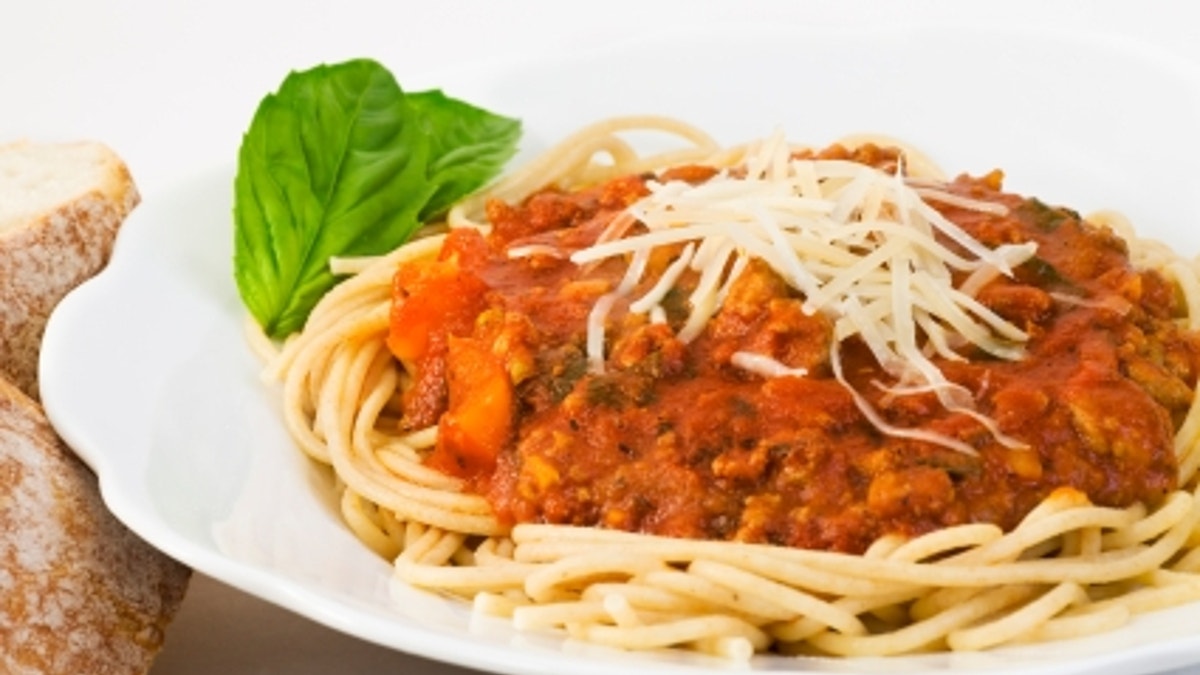
Bowl of whole wheat spaghetti and sauce. The sauce includes ground turkey, fresh basil, tomato sauce, bell peppers, onions, mushrooms, garlic, olive oil and italian seasonings.
LONDON, April 15 (Reuters) - Mars Food plans to tell customers to eat some of its Dolmio pasta sauces and macaroni cheese only once a week to maintain a balanced diet because of the products' high levels of salt, sugar or fat.
The scheme is part of a larger initiative by the privately owned U.S. food company to encourage healthier eating at a time when large food multinationals, or Big Food, are coming under increasing pressure from public health advocates and regulators struggling to fight a growing obesity epidemic.
The plan, however, does not extend to Mars' chocolate or sweets businesses, whose brands include M&M's, Snickers and Starburst.
Products that are particularly high in salt, sugar or fat, including Dolmio lasagne meal kits and lasagne sauces, will come with a label advising "occasional" consumption, meaning once a week. Products with lower levels of salt, sugar or fat will be considered "everyday" products.
The company said most of its products in the UK would fall into the latter category. However, only 70 percent of its tomato sauces sold in jars already meet that standard.
It did not give details for other countries but plans to introduce the labeling in all markets where those products are sold.
Nearly all packaged food makers are reformulating products as they try to keep up with changing tastes of increasingly health-conscious consumers.
Mars Food, which also produces Uncle Ben's rice, said it plans to post on its website within the next few months a list of "occasional" products, and "everyday" products, including ones to be reformulated over the next five years to reduce sodium, sugar or fat.
It has also set targets to reduce sodium across its global product range by an average of 20 percent by 2021, and cut the amount of added sugar in a limited number of sauces and light meals by 2018.
It also plans to boost the use of whole grains and vegetables.
Some countries including Britain, France and Mexico have announced levies on sugar-sweetened drinks, while others are considering them. (Reporting by Martinne Geller in London; Editing by Susan Fenton)
Mars Food plans to tell customers to eat some of its Dolmio pasta sauces and macaroni cheese only once a week to maintain a balanced diet because of the products' high levels of salt, sugar or fat.
The scheme is part of a larger initiative by the privately owned U.S. food company to encourage healthier eating at a time when large food multinationals, or Big Food, are coming under increasing pressure from public health advocates and regulators struggling to fight a growing obesity epidemic.
The plan, however, does not extend to Mars' chocolate or sweets businesses, whose brands include M&M's, Snickers and Starburst.
Products that are particularly high in salt, sugar or fat, including Dolmio lasagne meal kits and lasagne sauces, will come with a label advising "occasional" consumption, meaning once a week. Products with lower levels of salt, sugar or fat will be considered "everyday" products.
The company said most of its products in the UK would fall into the latter category. However, only 70 percent of its tomato sauces sold in jars already meet that standard.
It did not give details for other countries but plans to introduce the labeling in all markets where those products are sold.
Nearly all packaged food makers are reformulating products as they try to keep up with changing tastes of increasingly health-conscious consumers.
Mars Food, which also produces Uncle Ben's rice, said it plans to post on its website within the next few months a list of "occasional" products, and "everyday" products, including ones to be reformulated over the next five years to reduce sodium, sugar or fat.
It has also set targets to reduce sodium across its global product range by an average of 20 percent by 2021, and cut the amount of added sugar in a limited number of sauces and light meals by 2018.
It also plans to boost the use of whole grains and vegetables.
Some countries including Britain, France and Mexico have announced levies on sugar-sweetened drinks, while others are considering them. (Reporting by Martinne Geller in London; Editing by Susan Fenton)








































